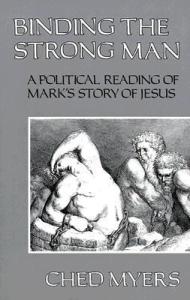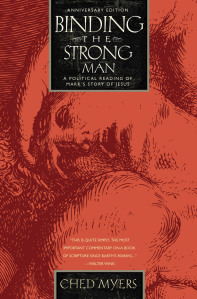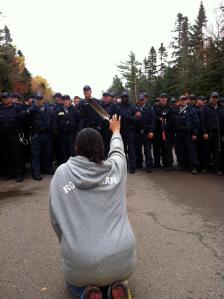Happy Birthday to Ched Myers! Today, we honor this cherished mentor and elder with an excerpt from Binding the Strong Man, Uncle Ched’s groundbreaking political reading of Mark’s Gospel. Written in the late 80s. More relevant than ever!
The radical discipleship movement today is beleaguered and weary. So many of our communities, which struggled so hard to integrate the pastoral and prophetic, the personal and the political, resistance and contemplation, work and recreation, love and justice, are disintegrating. The powerful centrifugal forces of personal and social alienation tear us apart; the “gravity” exerted by imperial culture’s seductions, deadly mediocrities, and deadly codes of conformity pull our aspirations plummeting down. Our economic and political efforts are similarly besieged. The ability of metropolis to either crush or co-opt movements of dissent seems inexhaustible.
Continue reading “There is Still No More Compelling Alternative”

 An excerpt from Ched Myers’
An excerpt from Ched Myers’  For our final Sunday installment celebrating 30 years of Ched Myers’
For our final Sunday installment celebrating 30 years of Ched Myers’  What I have learned from the witness of Ched Myers is that we can bring kairos moments like these into conversation with biblical moments, in ways that deepen understanding of the present day struggle and inspire prophetic action. His life’s work does not just demonstrate that we can build this bridge, but that we must, for the integrity of our faith and its call to justice. It is an intersection that enriches both our grasp of the historic texts and our commitment to current struggle. In Ched’s hands this process is never theoretical, but embodied, wading deep into the bible, but just as deeply into social change movements so that we’re grounded in, both rooted in story and struggle.
What I have learned from the witness of Ched Myers is that we can bring kairos moments like these into conversation with biblical moments, in ways that deepen understanding of the present day struggle and inspire prophetic action. His life’s work does not just demonstrate that we can build this bridge, but that we must, for the integrity of our faith and its call to justice. It is an intersection that enriches both our grasp of the historic texts and our commitment to current struggle. In Ched’s hands this process is never theoretical, but embodied, wading deep into the bible, but just as deeply into social change movements so that we’re grounded in, both rooted in story and struggle. 30 years in and Ched Myers’
30 years in and Ched Myers’